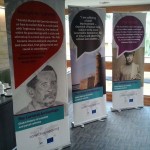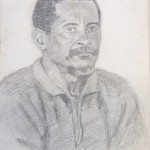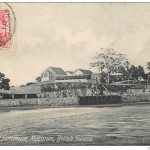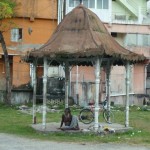
Juvenile Immigrants: An Experiment in Convict Labour?
By Kellie Moss. During the last two years as an affiliated researcher with the Carceral Archipelago Project my work has taken some fascinating turns as the parameters I selected to define my research have unexpectedly expanded. Initially interested in the role of convicts transported to the Swan River Colony in Western Australia my efforts in […]

The Carceral Archipelago conference – an early career perspective
By Jennie Jeppesen. At the beginning of her discursive remarks, Ebony Jones summed up best one of the most refreshing things about the Carceral Archipelago conference which took place between the 13th and 16th of September in Leicester. She said (and I paraphrase slightly here) “It is refreshing to be in a place and with […]

Arch Street Prison: A Prison without Convicts
By Kristin O’Brassill-Kulfan. Over the past two years, I’ve been welcomed as an affiliated researcher by the CArchipelago team with the tangible benefit of having learned more about both convict history and global history in this brief span of time than in a lifetime previous. My own work is less internationally defined than the avenues the […]

Convicts, Collecting and Knowledge Production in the Nineteenth Century
In previous blogs, I have explored some of the circulations and connections that linked nations, colonies and empires, and wove together practices of punishment and penal labour across polities and imperial spaces. This included the sharing of official reports, the spread and adaptation of particular modes of convict punishment, and the intra-colonial mobility of personnel […]

Where Empires Meet
In a previous blog, I wrote on the theme of the politics of comparison, of the connected history of circulation and mobility that underpins the CArchipelago project team’s approach to the historiography, theory and archive of penal colonies. Research associate Christian De Vito has since expanded the discussion, discussing the basis of various approaches […]

The politics of comparison: writing a global history of punishment
The Carceral Archipelago project faces enormous challenges in writing the history of punishment as global history. Our research ranges across almost five centuries, from Portugal’s first use of convicts in North Africa in 1415 to the closure of Stalin’s gulags in the 1960s. As readers of this blog will know, we are working on the […]

Legacies of a British penal colony: adivasis in the Andaman Islands
It is an unexpected pleasure to be back in the Andaman Islands for the first time in almost two years. I have been researching aspects of the Islands’ history for almost 15 years, and in 2013 completed a research project with two colleagues based in Ahmedabad: historian of science Dr Madhumita Mazumdar and anthropologist Professor […]

Remembering Exile and Transportation: some thoughts from Cape Town
Before I began The Carceral Archipelago project, my research was loosely centred on the history of Indian Ocean penal settlements and colonies, from the late nineteenth century to the Second World War. I have had the good fortune to work in archives across the region, including in Mauritius, India, the Andamans and Australia, and […]

Reconsidering Southern African Studies from the Indian Ocean
“Reconsidering Southern African Studies from the Indian Ocean.” This challenge underpinned two wonderful days of discussion at the University of the Western Cape last week. As a conference, we wanted to explore what the burgeoning Indian Ocean historiography and literature means for southern African studies; including how land and sea might come together, in our […]

The Clink restaurant at HMP Brixton: fine dining and prison education
By Sarah Longair, Carceral Archipelago Project Researcher. Having been aware of the work of The Clink Charity, an innovative and exciting initiative which establishes restaurants in prisons, I was thrilled to hear that the latest one to benefit was HMP Brixton, not far from where I live. The Clink has been established with the aim […]


 Subscribe to Clare Anderson's posts
Subscribe to Clare Anderson's posts
Recent Comments